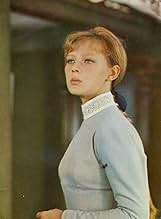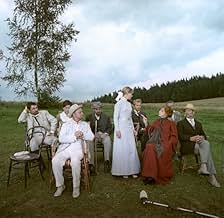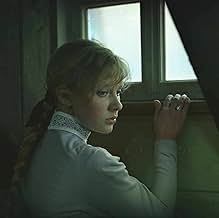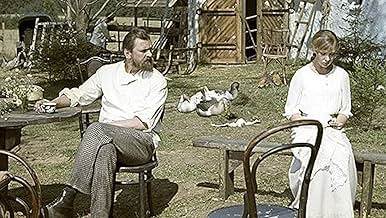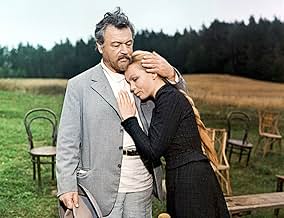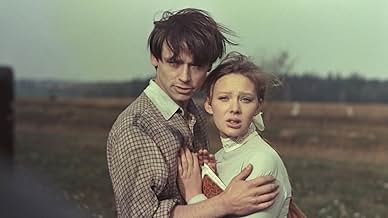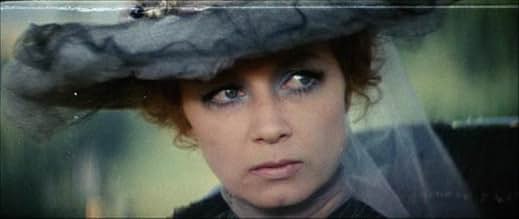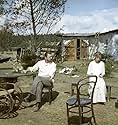Adicionar um enredo no seu idiomaBased on Chekhov's homonymous play, "The Seagull" narrates the story of a disturbed family and their acquaintances during summertime in the countryside.Based on Chekhov's homonymous play, "The Seagull" narrates the story of a disturbed family and their acquaintances during summertime in the countryside.Based on Chekhov's homonymous play, "The Seagull" narrates the story of a disturbed family and their acquaintances during summertime in the countryside.
- Direção
- Roteiristas
- Artistas
- Prêmios
- 1 indicação no total
- Direção
- Roteiristas
- Elenco e equipe completos
- Produção, bilheteria e muito mais no IMDbPro
Avaliações em destaque
It was only after many years of experience that I was able to even somewhat appreciate the works of Chekhov on stage and screen. Something was always missing from my Chekhov experience, something that kept me from comprehending the primal artistic force in Chekhov's works. And after many years of rejecting, ignoring and/or suffering through Chekhov's major works in production, I have finally found that magic scene that snapped everything into place for me, and has caused me to love and revere Chekhov for the brilliant master of human drama that he was. I am happy to say that this scene is contained in Chayka, and if you seek to understand what Chekhov was trying to do, you simply must track down this film.
So far as I can tell, the film is not currently available for purchase anywhere, so track it down in a university library if you are able to do so. You will find that the picture quality is absolutely horrendous, the subtitles are often spotty and difficult to read, and much of the action (or, more specifically, non-action) feels as though it is not moving at all. But none of that matters. What matters is that in the span of 10 minutes, Lyudmila Savelyeva squeezes out more pathos and passion than many actresses encounter in a lifetime. Savelyeva, probably best known to world audiences for her work in War and Peace, is quite simply the best actress at interpreting Chekhov's work that I have ever seen. The payoff is near the end of the film; with her character Nina returning to visit her former lover after a two-year absence. Even without the context of the rest of the story, this is an arresting scene, as the actress in her late 20's reads as though she has seen as much suffering as Mother Russia itself has experienced throughout her long history. Within the context of the story, Savelyeva's change is so magically and maddeningly profound that it should bring tears to the eye of even the most jaded film-goer.
This is the essence of Chekhov. I can honestly write that, since I first discovered this version of Chekhov's play three years ago, it has not lost any of its magic. My limited experience with Chayka, and more specifically with Savelyeva, has taught me more about Chekhov than 10 years of serious theatergoing and advanced academic study. Chayka has become my "Rosetta Stone" for understanding Chekhov, and it should be required viewing in the study of this Russian master.
So far as I can tell, the film is not currently available for purchase anywhere, so track it down in a university library if you are able to do so. You will find that the picture quality is absolutely horrendous, the subtitles are often spotty and difficult to read, and much of the action (or, more specifically, non-action) feels as though it is not moving at all. But none of that matters. What matters is that in the span of 10 minutes, Lyudmila Savelyeva squeezes out more pathos and passion than many actresses encounter in a lifetime. Savelyeva, probably best known to world audiences for her work in War and Peace, is quite simply the best actress at interpreting Chekhov's work that I have ever seen. The payoff is near the end of the film; with her character Nina returning to visit her former lover after a two-year absence. Even without the context of the rest of the story, this is an arresting scene, as the actress in her late 20's reads as though she has seen as much suffering as Mother Russia itself has experienced throughout her long history. Within the context of the story, Savelyeva's change is so magically and maddeningly profound that it should bring tears to the eye of even the most jaded film-goer.
This is the essence of Chekhov. I can honestly write that, since I first discovered this version of Chekhov's play three years ago, it has not lost any of its magic. My limited experience with Chayka, and more specifically with Savelyeva, has taught me more about Chekhov than 10 years of serious theatergoing and advanced academic study. Chayka has become my "Rosetta Stone" for understanding Chekhov, and it should be required viewing in the study of this Russian master.
It is easy, fair to, to consider it the best version of Chayka. For something who can be reduced, at the first sight, at impecable performances.
But the real virtue is the gentle game of nuances, reflecting the Chekhov universe defining this so fragil world.
I saw few ocassions this beautiful, in profound sense, adaptation, admiring, first, the great portrait of konstantin, proposed by Vladimir Chetverikov, the honest Trigorin, inspired explored by Iuri Iakovlev .
But the star of film remains , no doubts, Liudmila saveleva. For Nina monologue, off course. But , in same measure , for the dialogue with Trigorin , few close ups being just wonderful key to the essence of character and her evolution.
A masterpiece in very special terms.
But the real virtue is the gentle game of nuances, reflecting the Chekhov universe defining this so fragil world.
I saw few ocassions this beautiful, in profound sense, adaptation, admiring, first, the great portrait of konstantin, proposed by Vladimir Chetverikov, the honest Trigorin, inspired explored by Iuri Iakovlev .
But the star of film remains , no doubts, Liudmila saveleva. For Nina monologue, off course. But , in same measure , for the dialogue with Trigorin , few close ups being just wonderful key to the essence of character and her evolution.
A masterpiece in very special terms.
The Seagull is a play in two parts.
It is a wonderfully tragic love story written by Anton Chekov, adapted here for the screen by Yuli Karasik.
It begins with a group of people meeting at a cottage in the summertime.
An actress and her famous middlebrow writer of a husband. Her son, who is trying to establish himself as a symbolist playwright; and his girlfriend, who dreams of being a famous actress like his mother. Another young woman, who loves him, but is followed around by the school teacher like a puppy dog. The boy's grandfather, a, lonely, aging statesman. The doctor, who cares for him. And the landlord and his wife.
The secret here is that everyone loves someone who doesn't love them back. Making for a tangled web of intrigue, tragic love and despair.
The mother and her husband always fight. So he seeks attention elsewhere.
Her son feels he has failed in his artistic endeavours (that noone understands or appreciates), driving away his beloved girlfriend- who desires fame more than she does his adoration for her.
The other young woman who does truly love him, but is sought after by the school teacher, who she is resigned to marry to spite his lack of attention towards her.
His grandfather secretly loves his girlfriend. Though doesn't act on it due to his age.
The wife of the landlord loves the doctor, as her husband is loud and cruel, while he is gentle and kind.
While his girlfriend becomes enamoured by the fame of his mother's writer husband, and seeks to become his mistress.
All of this ends with a failed suicide attempt by the boy, who has lost all hope that he can attain true happiness.
Fast forward a number of years later, when the same group of people culminate under a single roof for a second time.
The landlord is still in a marriage with his unhappy wife.
The grandfather, now wheelchair bound, is retired from being a statesman, and remains alone, resigned for death.
The young woman, who did settle for the school teacher, remains unfulfilled by the arrangement.
His mother is still with the man whom she adores, despite the fact that he left her for another woman- only to return again later.
He has become an established writer who has found fame and appreciation, despite lacking the love and happiness he desperately seeks.
And the surprise return of his beloved former girlfriend, who was dropped as the mistress of his mother's husband, after bearing his child, which she later lost.
He wants to run away with her- two lovers on the lamb- but she is still caught up with her former dreams of becoming a famous actress. And leaves him high and dry.
Which leads to the story's explosive conclusion, that only Kurt Cobain could truly understand.
A femme fatale for the ages.
And a love story as tragic as Romeo and Juliet.
The film is designed as a straightforward middlebrow tale, with subtle symbolism playing out in the mise en scene.
Either way you approach it, however, the drama is consuming, and makes for a very immersing experience.
8.5 out of 10.
It is a wonderfully tragic love story written by Anton Chekov, adapted here for the screen by Yuli Karasik.
It begins with a group of people meeting at a cottage in the summertime.
An actress and her famous middlebrow writer of a husband. Her son, who is trying to establish himself as a symbolist playwright; and his girlfriend, who dreams of being a famous actress like his mother. Another young woman, who loves him, but is followed around by the school teacher like a puppy dog. The boy's grandfather, a, lonely, aging statesman. The doctor, who cares for him. And the landlord and his wife.
The secret here is that everyone loves someone who doesn't love them back. Making for a tangled web of intrigue, tragic love and despair.
The mother and her husband always fight. So he seeks attention elsewhere.
Her son feels he has failed in his artistic endeavours (that noone understands or appreciates), driving away his beloved girlfriend- who desires fame more than she does his adoration for her.
The other young woman who does truly love him, but is sought after by the school teacher, who she is resigned to marry to spite his lack of attention towards her.
His grandfather secretly loves his girlfriend. Though doesn't act on it due to his age.
The wife of the landlord loves the doctor, as her husband is loud and cruel, while he is gentle and kind.
While his girlfriend becomes enamoured by the fame of his mother's writer husband, and seeks to become his mistress.
All of this ends with a failed suicide attempt by the boy, who has lost all hope that he can attain true happiness.
Fast forward a number of years later, when the same group of people culminate under a single roof for a second time.
The landlord is still in a marriage with his unhappy wife.
The grandfather, now wheelchair bound, is retired from being a statesman, and remains alone, resigned for death.
The young woman, who did settle for the school teacher, remains unfulfilled by the arrangement.
His mother is still with the man whom she adores, despite the fact that he left her for another woman- only to return again later.
He has become an established writer who has found fame and appreciation, despite lacking the love and happiness he desperately seeks.
And the surprise return of his beloved former girlfriend, who was dropped as the mistress of his mother's husband, after bearing his child, which she later lost.
He wants to run away with her- two lovers on the lamb- but she is still caught up with her former dreams of becoming a famous actress. And leaves him high and dry.
Which leads to the story's explosive conclusion, that only Kurt Cobain could truly understand.
A femme fatale for the ages.
And a love story as tragic as Romeo and Juliet.
The film is designed as a straightforward middlebrow tale, with subtle symbolism playing out in the mise en scene.
Either way you approach it, however, the drama is consuming, and makes for a very immersing experience.
8.5 out of 10.
Você sabia?
- ConexõesReferenced in Eksperiment (1988)
Principais escolhas
Faça login para avaliar e ver a lista de recomendações personalizadas
Detalhes
Contribua para esta página
Sugerir uma alteração ou adicionar conteúdo ausente


